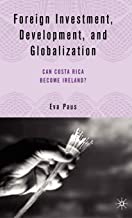This book engages the question, hotly debated among theorists and policymakers alike, of how a developing country’s pursuit of foreign direct investment (FDI) affects its development prospects in a globalized world. Can small latecomers (SLCs) to economic development use high-tech FDI to rapidly expand indigenous capabilities, thus shortcutting stages of the development process? What conditions, economic and non-economic, must be met for this strategy to succeed?
Using the cases of Costa Rica and Ireland, the author argues that unless SCLs can summon the political will and economic resources necessary to address pervasive market failures, foreign investment will not advance SLCs’ knowledge-based assets, upon which development ultimately depends. She shows how the dynamics of the FDI-development nexus have changed over time, rendering problematic Costa Rica’s attempt, and those of other latecomers, to replicate the Celtic Tiger’s success story.
Combining theoretical heterodoxy, comparative empirical analysis, and original research, including interviews with government policy-makers and corporate decision-makers, the book makes an important contribution to our understanding of the FDI-development nexus in the age of globalization.
